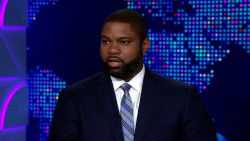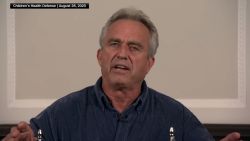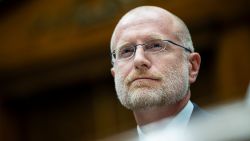Less than a day after voters in multiple states rebuked GOP leaders who would restrict abortion rights, five Republicans running for president ignored the issue for the first 99 minutes of their third primary debate.
Unlike their last gathering, a chaotic scramble of interruptions and cross talk, the debate Wednesday night in Miami did hammer away at points of substance. The rub? Almost all of it was focused on foreign policy.
And while those questions were surely worth debating – even if the candidates largely agreed on top lines like supporting Israel and opposing Hamas, Iran and China – the effect was ultimately disorienting: If the GOP is going to take back the White House, why ignore the political hurdles standing in its way?
Considering the candidates’ narrow interests, it made some sense. None of their views on abortion, which came out 20 minutes before closing time, are particularly popular at the moment. Taken together, former South Carolina Gov. Nikki Haley’s plea for consensus on the issue and South Carolina Sen. Tim Scott’s insistence on a 15-week federal ban echoed the logic set forth by Virginia Gov. Glenn Youngkin in the days and weeks before his state GOP colleagues came up short in a high-stakes legislative contest.
Abortion wasn’t the only divisive topic that got short shrift in Miami. Former President Donald Trump, too, was an afterthought for most of the night after receiving a few measured jabs, in absentia, early on and only at the prodding of the moderators. Florida Gov. Ron DeSantis summed up the argument against Trump, saying he is a “different guy than he was in 2016” and, like Haley, suggesting Republicans not go chasing past glories.
The tensest moments on the stage stemmed from a puzzlingly protracted series of exchanges about TikTok, the Chinese-owned social media platform that the candidates are happy to spend time dissing.
Vivek Ramaswamy was the lone dissenter on that front, talking up his use of the app as a campaign tool while his rivals pledged to bury it, then effectively calling Haley a hypocrite because her daughter used it.
Understandably infuriated, Haley told Ramaswamy to “leave my daughter out of your voice,” before dismissing him as “scum.” (Ramaswamy appeared to do his best to avoid Haley after the debate when the candidates’ families joined them onstage).
Former New Jersey Gov. Chris Christie, Trump’s harshest critic on cable news, hardly registered, putting another dent in his reputation as a shrewd (and occasionally crude) public speaker.
Here are six takeaways from the third GOP presidential primary debate:
Foreign policy takes center stage
On Israel’s war with Hamas, there was little disagreement between the five candidates. In fact, their answers were often quite similar.
“I’d be telling Bibi: Finish the job once and for all with these butchers,” DeSantis said, referring to the Israeli prime minister by his nickname.
“The first thing I said to him when it happened was I said, ‘Finish them,’” Haley said moments later.
But there were sharp divisions over whether the United States should continue to support Ukraine against Russia’s aggression.
Ramaswamy left no doubt where he stood, issuing a lengthy rebuke of Ukrainian President Volodymyr Zelensky while accusing the war-torn country of harboring Nazism and anti-democratic beliefs.
“To frame this as some kind of battle between good versus evil. Don’t buy it,” Ramaswamy said.
Haley, continuing to tussle with Ramaswamy onstage, said that Russian President Vladimir Putin and Chinese leader Xi Jinping were “salivating at the thought that someone like that could become president.”
Christie agreed.
“Let’s remember, the last time that we turned our back on a shooting war in Europe,” Christie said. “It bought us just a couple of years. And then 500,000 Americans were killed in Europe to defeat Hitler. This is not a choice.”
DeSantis and Scott shifted the conversation from Ukraine to the US-Mexico border and left doubt as to whether they believe US support for the country should continue.
“We are not going to send your sons and daughters to Ukraine,” the Florida governor said. “I am going to send troops to our southern border.”
It was like Tuesday night never happened
Just like in the second debate, abortion concerns didn’t make it into the first more than 90 minutes of the program. This time, though, the exclusion was especially notable, as it came a night after Ohio voters enshrined abortion rights into their state constitution and Republicans suffered defeats in key races across the country where the issue of abortion loomed large.
When the topic was finally broached, most of the candidates held firm with their positions, suggesting they had not been moved by Tuesday’s results.
Scott stood by his calls for a 15-week federal ban while Haley continued to push for a middle-of-the-road approach.
“When we’re looking at this, there are some states going more on the pro-life side. I welcome that,” Haley said. “There are some states going more on the pro-choice side. I wish that wasn’t the case, but the people decided.”
DeSantis, meanwhile, seemed to put Tuesday’s losses at the feet of anti-abortion groups, saying they had been “caught flat-footed on these referenda.” Since the reversal of Roe v. Wade, voters in states across the political spectrum – including Kansas, Michigan, California, Vermont and now Ohio – voters have affirmed the right to an abortion in ballot measures.
It’s a stark reversal from the second debate, when DeSantis said of the 2022 election results, “I reject this idea that pro-lifers are to blame for midterm defeats.”
It wasn’t the only answer on abortion on which DeSantis flipped. After declaring at the September debate that he would sign a bill to block the procedure after 15 weeks as president if it reached his desk, DeSantis went back to ducking support for a federal ban.
“Iowa is not necessarily going to do it the same as Virginia, so you’ve got to work from the bottom up,” he said Wednesday.
Christie said Tuesday’s results were what the constitutional framers wanted and what anti-abortion advocates had hoped for in overturning Roe v. Wade: letting the states decide.
“Now we have people running to say, ‘Let’s short-circuit the states from doing what they need to do and let’s go right to some type of federal ban at a certain number of weeks,” he said.
DeSantis and Haley spar over China
DeSantis criticized Haley for recruiting a Chinese fiberglass company to come to her state during her tenure as governor.
“She welcomed them into South Carolina, gave them land near a military base, wrote the Chinese ambassador a love letter, saying what a great friend they were. That was like their No. 1 way to do economic development,” DeSantis claimed.
“In Florida, I banned China from buying land in the state,” he continued. “We kicked the Confucius Institutes out of our universities. We’ve recognized the threat, and we’ve acted swiftly and decisively.”
Haley wasn’t given an opportunity to immediately respond, but she didn’t let the critique slip by and later attacked DeSantis’ own record through his state’s economic development agency.
“Yes, I brought a fiberglass company 10 years ago to South Carolina, but, Ron, you are the chair of your economic development agency that, as of last week, said Florida is the ideal place for Chinese businesses,” she claimed.
Ramaswamy entered the tussle, saying DeSantis was “correct” to point out Haley’s previous support of Chinese investment, but the entrepreneur went on to criticize the Florida governor over ties to a donor who lobbied on behalf of Chinese investment in the US.
That appeared to be a reference to reports that DeSantis donor Ken Griffin, the CEO of the hedge fund Citadel, pushed to amend a bill that allowed Chinese nationals to purchase property near military bases in the US. DeSantis denied Ramaswamy’s assertions.
Ramaswamy comes out swinging
During the first debate, Ramaswamy called the other Republican candidates “super PAC puppets.” At last month’s Simi Valley, California event, he toned it down, calling them “good people tainted by a broken system.”
The question, then, was which version would show up in Miami: the quippy former debate kid or the dignified statesman? The answer was clear within minutes. The biotech entrepreneur came out swinging against the media, Haley, the debate moderators, the media, Republican National Committee Chairwoman Ronna McDaniel, DeSantis and the Florida governor’s boots.
Basically, anyone but Trump was fair game.
Asked why voters should back him over Trump, Ramaswamy aired out a long list of grievances. First, he blamed McDaniel for the string of losses Republicans have suffered since 2017, when she was elected RNC chair (but also, notably, when Trump took office), and gave her the option to come onstage and resign. Then he blasted the decision to have NBC News’ Lester Holt and Kristin Welker host with Salem Radio’s Hugh Hewitt.
“Think about who’s moderating this debate — this should be Tucker Carlson, Joe Rogan and Elon Musk,” he said, before blasting the “corrupt media establishment.”
On Israel, Ramaswamy said he would encourage Israeli Prime Minister Benjamin Netanyahu to “smoke those terrorists on his southern border” while the presidential candidate would be “smoking the terrorists on our southern border.” Ramaswamy, who has sought to distinguish himself as an America First candidate in a field of “neocons,” then took a dig at Haley for her foreign policy. DeSantis, who has battled speculation over his boots, got caught in the crossfire.
“Do you want a leader of a different generation who’s going to put this country first, or do you want Dick Cheney in 3-inch heels?” Ramaswamy said. “We’ve got two of them.”
The Haley-Ramaswamy feud gets personal
Heading into Wednesday night, the expectation – based on candidate stump speeches and ads – was that the sharpest exchanges would occur between DeSantis and Haley, the two candidates vying for a distant second place behind Trump. Instead, the former South Carolina governor spent much of the debate sparring with Ramaswamy.
Over the course of three debates, the feud between the two Indian Americans has grown increasingly personal. This was no different – within minutes, Ramaswamy commented on her “3-inch” heels, and she shot back that they were 5-inch heels, and “for ammunition.” Things went downhill from there.
That’s not to say Haley and DeSantis didn’t exchange words. Haley called the Florida governor a “liberal” on the environment because he didn’t support drilling off the shore of his state, and the two rehashed many of their attacks on China that were previewed in recent weeks. But that criticism, which centers on Haley’s recruitment of Chinese business to South Carolina when she served as governor, took on a heated tone when Ramaswamy got involved.
As Haley stated that comments she made praising China were in response to her work during her tenure as US ambassador to the United Nations negotiating North Korea sanctions with Beijing, Ramaswamy interrupted to say that she called China a “great friend.” That led to about 20 seconds of cross talk.
In one of the tensest moments of the night, Ramaswamy criticized Haley for calling out his campaign’s use of TikTok, which some Republicans want to ban over security concerns, and brought her daughter into it. During the Simi Valley debate, Haley said during a discussion about the app that she felt “dumber” every time she heard him speak.
“She made fun of me for actually joining TikTok while her own daughter was actually using the app for a long time,” he said. “So you might want to take care of your family first.”
The crowd booed and Haley jumped in.
“Leave my daughter out of your voice,” she said, before adding: “You’re just scum.”
Christie and Scott become the fringe candidates
One could be forgiven for forgetting that Christie and Scott were even on the debate stage Wednesday night. The other three candidates were more interested in scoring shots at each other and seemed to view Christie and Scott as lagging too far behind in the polls to spend much time on.
There were only a few moments when Scott or Christie were even addressed. In one , Haley knocked her fellow South Carolinian on abortion after he said that, as president, he would back a “15-week national limit” on the procedure and urged both DeSantis and Haley to agree with him. Haley countered that there was an anti-abortion bill sponsored by South Carolina Sen. Lindsey Graham that Scott refrained from supporting and that he’s been vague on his position on abortion. Scott shot back, “That’s just not true.”
For the most part though, Scott and Christie didn’t really get into the fray – and the other three candidates were fine with that.
This story has been updated with additional information.






















